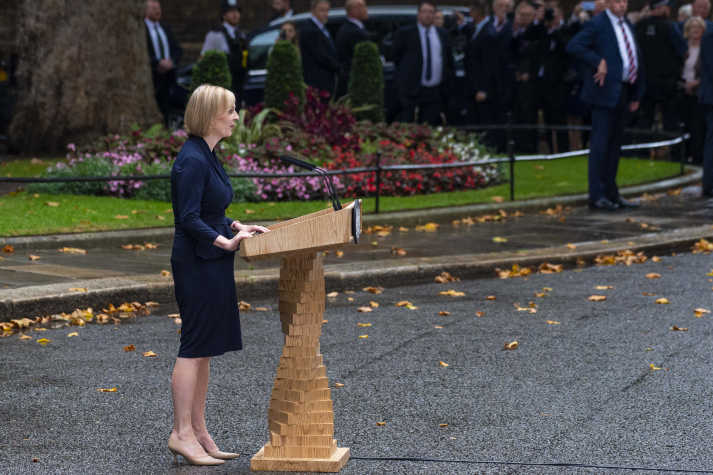| Voice |
| New PM, old 'prescription'? | |
|
|
 Liz Truss delivers her first address as the UK's prime minister outside No.10 Downing Street in London on September 6 (XINHUA)
On September 5, the UK's Foreign Secretary Liz Truss prevailed in a two-month race to succeed Boris Johnson as Conservative Party leader and the next day she was formally appointed by Queen Elizabeth II in Scotland as the UK's new prime minister. Her victory came as no surprise. Truss proved a favorite in the polls ever since the last two candidates were confirmed and she maintained a large lead over her rival—former Chancellor of the Exchequer Rishi Sunak. A successor Judging from the policies they announced in the campaign, Truss and Sunak did not differ much in their governance philosophies, despite minor differences, as both declared they would reduce taxes and stabilize public expenditure, which were expected to curb inflation and boost the economy. But there were other factors at play that led to the new prime minister's electoral success, with her loyalty to Johnson being an important one. Johnson's Culture Secretary Nadine Dorries, an avid Truss backer, publicly suggested Sunak was part of a "coup" that brought down Johnson, saying Conservative members of parliament had made a "huge mistake" removing the prime minister. Sunak took the lead in resigning from the cabinet after seeing Johnson in crisis, and carefully planned his campaign to run for party leader, drawing accusations of politically speculating. Truss, instead, backed Johnson. Although Johnson had stated he would not publicly support any particular candidate, he did scoff at Sunak on several important occasions. Truss' loyalty was undoubtedly affirmed by Johnson, bringing her more supporters in the election. More importantly, both former and current prime ministers seem to agree on world views and values. Truss is a staunch supporter of Johnson's governing philosophy, which is not to simply execute orders, but to achieve a high degree of unity in values and ideology. In dealing with the Russia-Ukraine conflict, for example, they shared similar ideas and actions. It is expected Truss will continue to promote Johnson's domestic and foreign policies and further implement the strategic layout of the previous government. Obstacles A social crisis has surfaced in the UK with social groups and organized trade unions poised to put more pressure on the government. Lawyer strikes, railway worker walkouts and the "Don't Pay" movement against the rise in energy bills popped up one after the other, stirring the government. Truss promised to take action on energy bills and cut taxes in her first address as prime minister. And these are actually the most severe problems facing the population. After the UK and European countries imposed a series of heavy sanctions against Russia in light of the ongoing conflict, people were forced to deal with high costs of living due to the rising prices of oil and gas following greatly reduced supplies coming in from Russia. The "Don't Pay" movement demanded the government solve the problem. Then there's the high inflation in the UK, which hit 10.1 percent in July, marking a 40-year high—with no end in sight. Soaring consumer prices can be partly attributed to the costs the UK paid in the fight against the COVID-19 pandemic over the past two to three years. A more serious issue that goes hand in hand with the growing inflation pressure is the UK's gloomy economic outlook. According to the International Monetary Fund, India overtook the UK to become the world's fifth largest economy in the final three months of 2021 and India's lead expanded in the first quarter of this year. The growth gap between both countries is widening. India's economy is expected to grow by 7 percent in the years to come. The UK's GDP, however, is likely to increase only by half of that this year and to see negative growth in 2023. With economic recession and high inflation, the UK seems to be on the fast track back to the 1970s, when Margaret Thatcher first stepped onto the scene. And now Truss, who has been likened to Thatcher, has assumed office. But whatever the future may hold, remains to be seen.  A driver fuels his car at a petrol station in Manchester on April 13 (XINHUA)
Discord The risk of division within the Conservative Party mustn't be underestimated. It has pretty much fallen apart since David Cameron's reign as leader of the party from 2005 to 2016. As mayor of London (2008-16), Johnson was initially Cameron's political ally. But then Johnson stood in opposition to Cameron by backing Brexit and his very public challenge to the Conservative leadership directly led to the collapse of the Cameron cabinet, and the party lost several competent ministers. In came Theresa May, who stood powerless against the rift between Leavers and Remainers within the party. May resigned after failing to achieve a way for the UK to leave the EU supported by parliament. It was a time of great political turmoil as the government repeatedly lost votes. Plus, the Conservatives once again lost a pragmatic team. Then Johnson came to power. He did put an end to the Brexit issue and brought votes back to the Conservative Party, but there were few good ministers left to appoint in his cabinet and he had to reshuffle it frequently. Johnson was finally forced to resign for failing in his duty of oversight, disobeying his own rules on the pandemic and violating the law. But the crux of the matter is there are now only few people available for use within the party. What Truss took over is a party in disarray. And although Truss is the new Conservative leader and prime minister by a relative advantage, her election saw the lowest margin of victory since 2001. According to the YouGov, a global public opinion and data company, only 12 percent of Britons expect Truss to be a good or great prime minister, with half (52 percent) expecting her to perform poorly or terribly. Divisive opinions will remain a norm under the Truss cabinet. She has given herself two years and has already mentioned the 2024 general election. But whether she's able to stay in office until the election remains to be seen. And some voices are already urging for a snap general election. For now, Truss will inherit most of Johnson's foreign policies. "Global Britain" is a concept about reinvesting in the country's relationships, championing the making of international rules, and demonstrating that the UK is open, outward-looking and confident on the world stage. But it remains a flag British politicians planted in the aftermath of Brexit. No longer a member of the EU, the country can now only turn to the broader international community. Given its declining economy, the UK cannot undertake major global investment and activities on its own. It will have to maintain a close relationship with the U.S., promote the existing U.S.-led systems and seize opportunities to develop new mechanisms. BR The author is a researcher with the Center for British Studies at the Shanghai Academy of Global Governance and Area Studies, Shanghai International Studies University Copyedited by Elsbeth van Paridon Comments to zhangshsh@cicgamericas.com |
|
||||||||||||||||||||||||||||
|